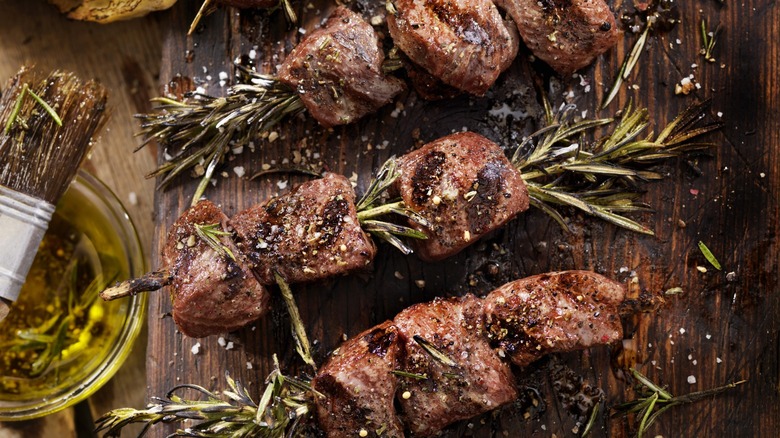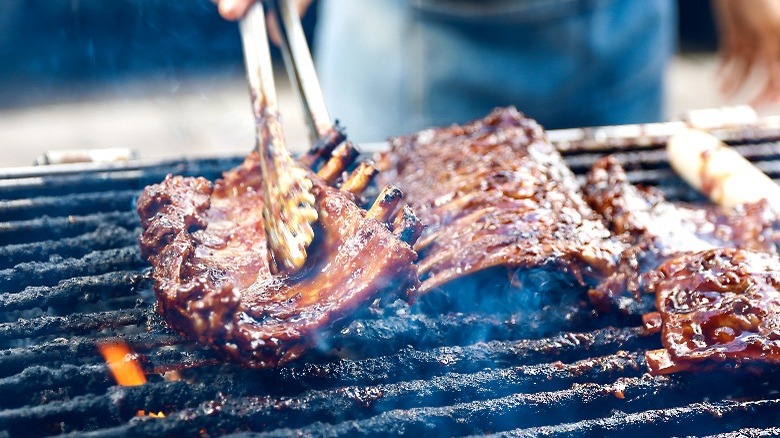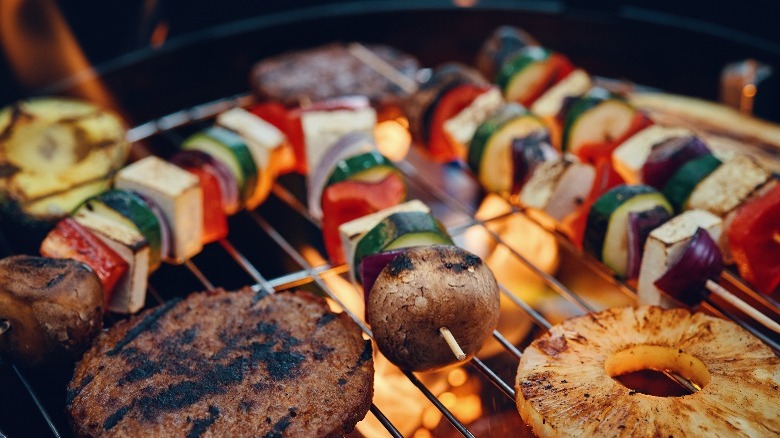The Charcoal Herb Hack To Bring Out The Most Flavor In Your BBQ
As any pitmaster or backyard barbecue aficionado will tell you, a few trade secrets are needed for a better grilling experience. While most tend to revolve around the types of components you'll need, like which vegetables, fruits, or cuts of meat to use when you fire up the grill, there's another hack that focuses more on enhancing the tastes already provided by your charcoal or other smoke-giving elements, like wood.
Placing herbs directly on top of the grill's heat source will not only provide a more pleasant scent to the thick smoke coming off your barbecue but also infuse some added flavor to whatever protein or ingredient is cooking over the coals, briquettes, or type of wood you're smoking with. This is important since smoke is a crucial ingredient when barbecuing as a flavoring agent that also tenderizes the meat. Moreover, Monell Chemical Senses Center sensory scientist Marcia Pelchat told The Washington Post, "Most of the flavor of smoke is smell." So, incorporating aromatic herbs into your charcoal might be the best way to integrate those aromas into your food while grilling.
How smoke works when barbecuing
Regarding the grill, there are three ways to go about the cooking process: barbecuing, grilling, and smoking. Grilling involves direct heat so the food will cook faster and at a higher temperature over the flames. On the other hand, barbecuing uses a much smaller fire, at a slower pace, and indirect heating (by placing the ingredients off to the side, away from hot spots). Lastly, smoking also cooks ingredients in an indirect way, but primarily with smoke fumes. Nevertheless, all three cooking techniques can be achieved interchangeably or simultaneously on the same grill. When utilizing the herbs-on-coals hack, the longer your food spends in the smoke, the more it will soak up those savory, hazy aromas.
Smoke comprises various gases and other diminutive particles, like water vapor, that occur during combustion. Additionally, chemicals like lignin and cellulose — which make up the main components of wood — can also be found in smoke and are often attributed to the savory scents and flavors detected during cookouts. Burning herbs is a natural way to enhance these elements. These gases help proteins cook because the flavors envelop the meat and permeate into the fat, resulting in the Maillard reaction, which tastes great and gives grill-cooked items their distinct browned and crusted look. While tossing herbs onto the fire will add fragrances to the smoke, some work better than others, and there are a few things to keep in mind.
Some herbs work better than others with this techinque
As Carolyn Dille, herb authority and cookbook author, told The Washington Post in the '80s, soaking herbs in water will produce an abundance of smoke. This makes sense because wet ingredients smolder, giving the scented smoke ample time to transfuse. However, she added, " ... the tricky part is knowing your grill so that you put the wet herbs on the fire in the right amount at the right time ... You don't want to cool down the fire too much and lower the heat."
Moreover, which herbs you use matters. Dried herbs tend to burn quickly, so they should be avoided. Nonetheless, the amount used is just as significant and will vary depending on the ingredient used. For example, fresh cilantro can be pungent, so a few leaves and stems will do. However, plants such as rosemary, thyme, oregano, or bay leaves are subtle in comparison, so more might be necessary, considering how herbaceous you want the smoke flavor to be.
Regardless of which direction you go with your herb selection, as long as the aromas complement the meat or vegetables (or fruit) cooking, you can get as creative as you'd like. Chef Derek Lucci of makebistro told Thrillist that grated coconut sprinkled over coals is a traditional Thai barbecuing approach that creates a nutty, smoke-filled flavor. So, the next time you light the grill, try tossing in some herbage.


